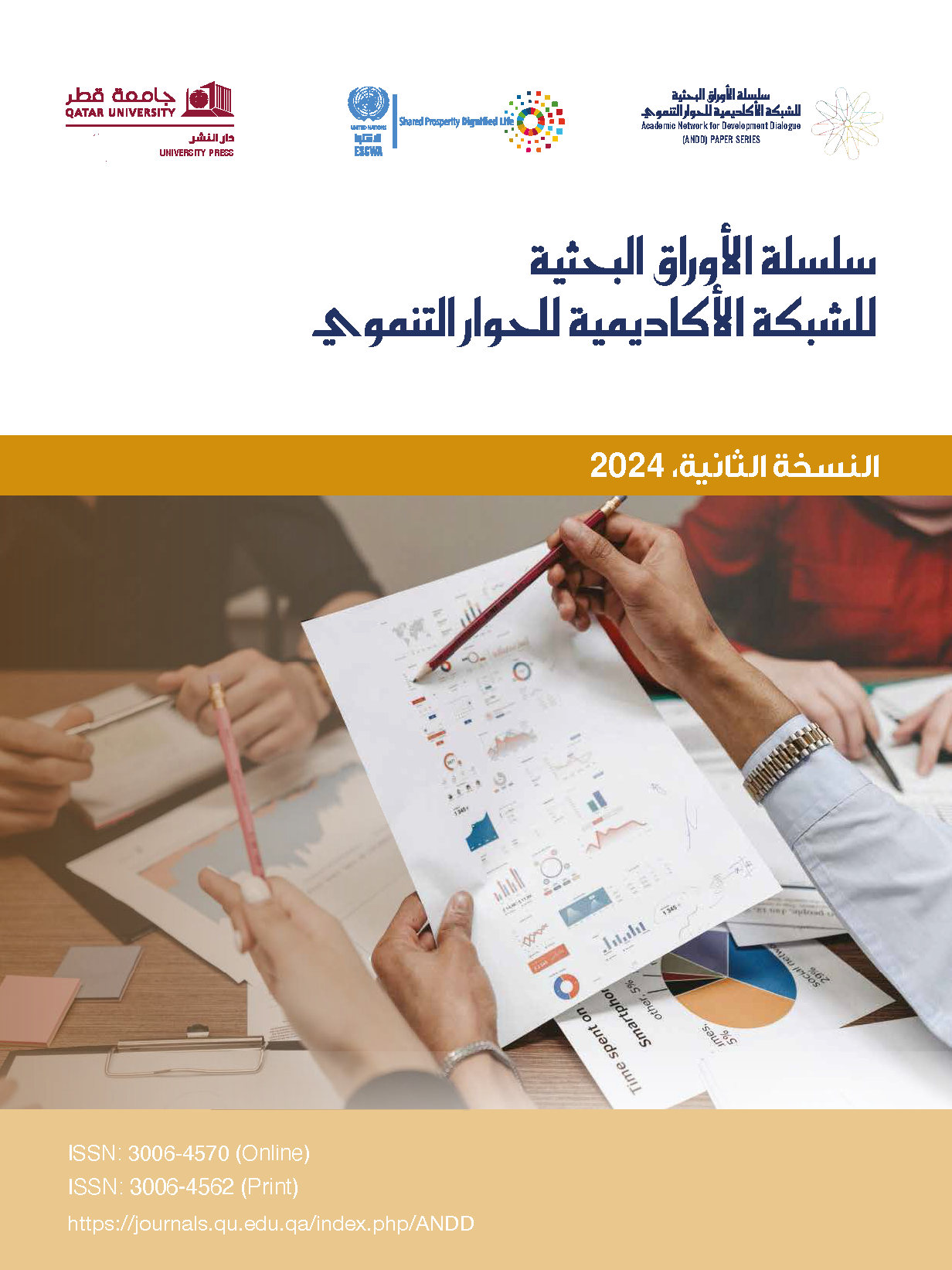تطوير المهارات في زمن الذكاء الاصطناعي: رؤية مستدامة للرفاه
الملخص
يستعرض البحث أهمية تطوير المهارات كوسيلة للتكيف مع أحدث التحولات التكنولوجية وهي الذكاء الاصطناعي؛ حيث تشير الأبحاث إلى وجود ما يعرف بتجويف الوسط فيما يتعلق بالمهارات الموجودة، فالتحولات التكنولوجية وخاصة المدعومة بالذكاء الاصطناعي تعمل على القضاء على المهارات المتوسطة وزيادة المهارات العالية وكذا المهارات المتدنية ومنه إحداث خلل هيكلي في سوق العمل، وتشير أحدث الدراسات إلى أن ما يقرب من 40% من العمالة العالمية معرض للذكاء الاصطناعي مع وجود تفاوت بين الدول المتقدمة والأسواق الناشئة والبلدان منخفضة الدخل، ويجد صناع السياسة وأصحاب القرار أنفسهم أمام مشكلة عدم مواءمة الوظائف وليس قلتها، بناء عليه يجب على الأفراد تعلم مهارات جديدة وتطوير قدراتهم لتلبية احتياجات سوق العمل الجديدة، وتعظيم دخولهم ليتمكنوا من توسيع خياراتهم في الحياة، من خلال تحسن الإنفاق على الصحة والتعليم، فرخاء الأفراد وتحسن معيشتهم يدفعهم الى البحث عن سبل أكثر سرعة وفاعلية لتعظيم الدخل وبالتالي الرفاه الخاص لكل منهم، ويشير البحث إلى أن هذا التحدي ليس مجرد مسؤولية الأفراد فحسب، بل يشمل أيضًا المؤسسات التعليمية وأصحاب القرار، ويقترح البحث تصميم مناهج تعليمية مستدامة ومبتكرة تعزز من تطوير المهارات الأساسية، وزيادة تدخل الدولة بما يخدم سوق العمل من ناحية تقليل الفجوة المهاراتية التي هي مفتاح تقليل البطالة في ظل هذه التحولات المتسارعة، بالإضافة إلى بناء الجسور بين التعليم والتدريب والصناعة وقطاع الأعمال بصفة عامة، والعمل على تحرير المبادرات خاصة في قطاع التعليم العالي بما يسمح باكتساب المهارات الجديدة وتطوير المهارات القائمة.
##plugins.themes.bootstrap3.article.details##
المهاراتسوق العملالذكاء الاصطناعيالتدريبالرفاه
Alekseeva, L., Azar, J., Giné, M., Samila, S., & Taska, B. (2021). The demand for AI skills in the labor market. Labour Economics, 71. https://doi.org/10.1016/j.labeco.2021.102002. Retrieved from: https://www.sciencedirect.com/science/article/pii/S0927537121000373
Bertuzzi, L.(2023, November 9). OECD updates definition of Artificial Intelligence ‘to inform EU’s AI Act’. EURACTIV MEDIA NETWORK. Retrieved from: https://www.euractiv.com/section/artificial-intelligence/news/oecd-updates-definition-of-artificial-intelligence-to-inform-eus-ai-act/#]
Boahin, P., & Hofman, W. H. A. (2014). Perceived effects of competency-based training on the acquisition of professional skills. International Journal of Educational Development, 36. Retrieved from: https://www.sciencedirect.com/science/article/pii/S0738059313001016. https://doi.org/10.1016/j.ijedudev.2013.11.003
Cazzaniga, M., Jaumotte, F., Li, L., Melina, G., Panton, A. J., Pizzinelli, C., Rockall, E. J., & Tavares, M. M. (2024). Gen-AI: Artificial Intelligence and the Future of Work. International Monetary Fund. Retrieved from: https://www.imf.org/en/Publications/Staff-Discussion-Notes/Issues/2024/01/14/Gen-AI-Artificial-Intelligence-and-the-Future-of-Work-542379?cid=bl-com-SDNEA2024001.
Corporate author. (2013). Building better formal TVET systems : Principles and practice in low- and middle-income countries. UNESCO, World Bank, International Labour Organization. Retrieved from: https://unesdoc.unesco.org/ark:/48223/pf0000386135.
Costa, R., Liu, Z., McNally, S., Murphy, L., Pissarides, C., Rohenkohl, B., Valero, A., & Ventura, G. (2023, October). Learning to grow: How to situate a skills strategy in an economic strategy. Resolution Foundation. Retrieved from: https://economy2030.resolutionfoundation.org/wp-content/uploads/2023/10/Learning-to-grow-report.pdf
Cournoyer, M. (2019, August 21). The Future of Work and Skills Acquisition – A shift in mindset is needed. Job Market Monitor. Retrieved from: https://jobmarketmonitor.com/2019/08/21/skills-acquisition-a-shift-in-mindset-is-needed/
Fabian Stephany, Ole Teutloff (2023). What is the Price of a Skill? The Value of Complementarity. Research Policy. Retrieved from: https://papers.ssrn.com/sol3/papers.cfm?abstract_id=4234078
Green, A. (2023). Intelligence artificielle et emploi : aucun signe de fléchissement de la demande de main-d’œuvre (pour l’instant). OCDE. https://doi.org/10.1787/aae5dba0-fr
Green, A., & Lamby, L. (2023). The supply, demand and characteristics of the AI workforce across OECD countries. OECD Social, Employment and Migration Working Papers, No. 287. https://doi.org/10.1787/bb17314a-en
Guarascio, D., Reljic, J., & Stöllinger, R. (2023). Artificial Intelligence and Employment: A Look into the Crystal Ball (GLO Discussion Paper No. 1333). Global Labor Organization (GLO). Retrieved from: https://www.econstor.eu/bitstream/10419/278106/1/GLO-DP-1333.pdf
Hentschel, J. (2017). Skills or jobs: Which comes first? IZA World of Labor, 339. https://doi.org/10.15185/izawol.339
International Labour Office. (2010). A Skilled Workforce for Strong, Sustainable and Balanced Growth: A G20 Training Strategy. Geneva. Retrieved from: https://www.oecd.org/g20/summits/toronto/G20-Skills-Strategy.pdf
Kavanagh, C. (2019). New Tech, New Threats, and New Governance Challenges: An Opportunity to Craft Smarter Responses? In Report Part Title: Artificial Intelligence. Carnegie Endowment for International Peace. Retrieved from: https://carnegieendowment.org/files/WP_Camino_Kavanagh___New_Tech_New_Threats1.pdf
Lassebie, J. (2023). Skill Needs and Policies in the Age of Artificial Intelligence. Organization for Economic Co-operation and Development (OECD). Retrieved from : https://www.oecd-ilibrary.org/sites/08785bba-en/1/3/5/index.html?itemId=/content/publication/08785bba en&_csp_=9f4368ffe3fc59de4786c462d2cdc236&itemIGO=oecd&itemContentType=book#tablegrp-d1e16959-12b89ec173
Maslej, N., Fattorini, L., Brynjolfsson, E., Etchemendy, J., Ligett, K., Lyons, T., Manyika, J., Ngo, H., Niebles, J. C., Parli, V., Shoham, Y., Wald, R., Clark, J., & Perrault, R. (2023). The AI Index 2023 Annual Report. AI Index Steering Committee, Institute for Human-Centered AI, Stanford University. https://aiindex.stanford.edu/wp-content/uploads/2023/04/HAI_AI-Index-Report_2023.pdf
Mok, A. (2023). Want a pay bum p? Learn how to use AI. Here's how much the skill could be worth based on your job. Business Insider. Retrieved from: https://www.businessinsider.com/how-to-get-job-ai-skills-pay-raise-work-2023-12
Nurkin, T., & Rodriguez, S. (2019). A Candle in the Dark: US National Security Strategy for Artificial Intelligence. In Report Part Title: INTRODUCTION. Atlantic Council. Retrieved from: https://www.atlanticcouncil.org/wp-content/uploads/2019/12/AC_CandleinDark120419_FINAL.pdf
OECD.AI (2024), visualisations powered by JSI using data from LinkedIn, accessed on 6/6/2024, www.oecd.ai.
OECD.AI (2024), visualisations powered by JSI using data from www.adzuna.co.uk, accessed on 6/6/2024, www.oecd.ai.
Robert Half. (2023, October 9). What skills does the workplace of the future need in Australia? Retrieved from: https://www.roberthalf.com/au/en/insights/research/what-skills-does-workplace-future-need-australia
Salesians. (2017, November 24). Italy - Dual Education System in Vocational Training: a success that requires regulatory stabilization. ANS. Retrieved from: https://www.infoans.org/en/sections/news/item/4405-italy-dual-education-system-in-vocational-training-a-success-that-requires-regulatory
Sanusi, I. T., Olaleye, S. A., Agbo, F. J., & Chiu, T. K. F. (2022). The role of learners’ competencies in artificial intelligence education. Computers and Education: Artificial Intelligence, 3, 100098. https://doi.org/10.1016/j.caeai.2022.100098
Stanford University. (2023). The 2023 Stanford AI Index. Retrieved from: https://aiindex.stanford.edu/ai-index-report-2023/#individual-chapters
Sung, J., & Ramos, C. (Eds.). (2014). Skills strategies for an inclusive society: The role of the state, the enterprise and the worker. Institute for Adult Learning, Singapore. Retrieved from: https://web.archive.org/web/20150501122705/http://www.ial.edu.sg/files/documents/564/Skills-Strategies-for-an-Inclusive-Society.pdf
Wilson, H., Daugherty, P., & Morini-Bianzino, N. (2017). The Jobs That Artificial Intelligence Will Create. Retrieved from: https://sloanreview.mit.edu/article/will-ai-create-as-many-jobs-as-it-eliminates/
Zhoum, Q. (2023). Research progress on the impact of artificial intelligence on the labor market. Advances in Economics and Management Research, 8. Retrieved from: https://www.michaelwebb.co/webb_ai.pdf



 https://orcid.org/0000-0003-4600-7315
https://orcid.org/0000-0003-4600-7315